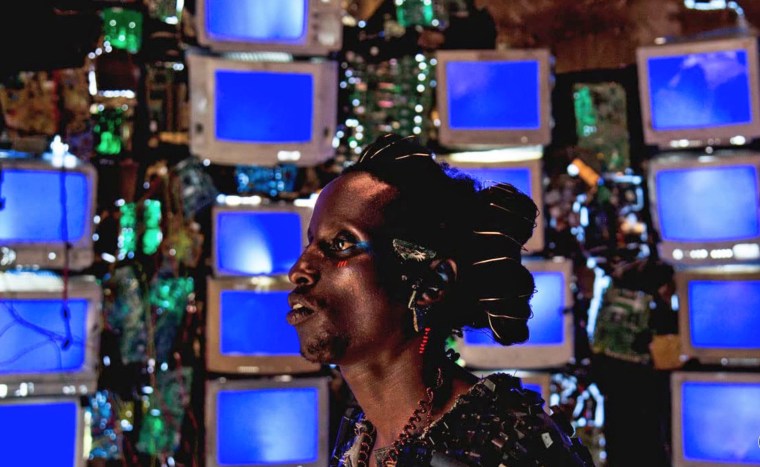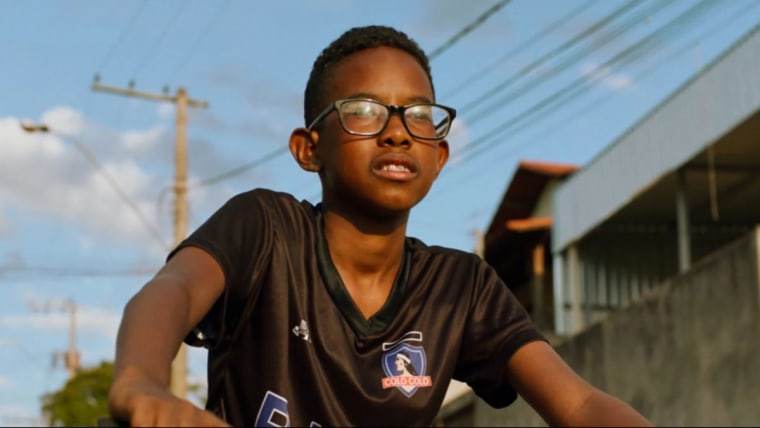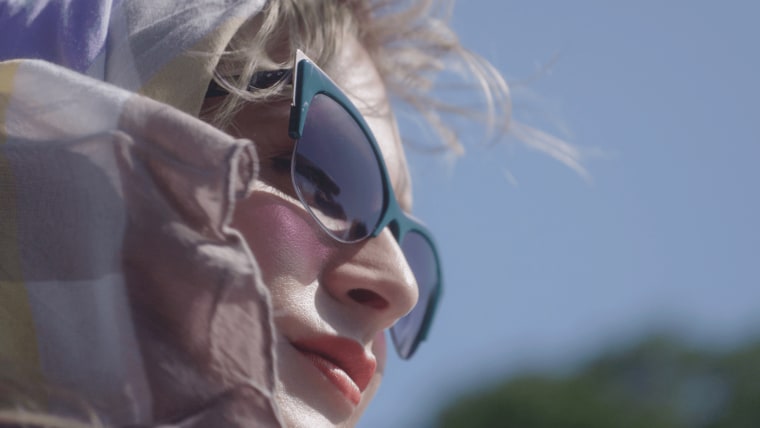It wasn’t supposed to be like this. Despite the success of an almost entirely virtual event last year, the organizers of the Sundance Film Festival had been eagerly prepping a hybrid fest for 2022 that would have allowed filmmakers, buyers, critics and entertainment lovers to safely rendezvous in person once again — in their natural late-January habitat of Park City, Utah — to celebrate the best in indie cinema.
Then came omicron. Two weeks ago, the festival’s powers-that-be announced that out of an abundance of caution, Sundance 2022 (which runs Thursday through Jan. 30) would again go mostly virtual. It was bad news for industry insiders who had been planning on a Park City reunion, but good news for the wider film-viewing public, who will now have more chances to see some of the latest, best and most cutting-edge filmmaking on the planet — including many queer-themed titles — without having to wait months for things to work their way through the usual pre-pandemic distribution channels.
For Festival Director Tabitha Jackson — a Sundance veteran who took the reins in early 2020, just as Covid-19 began to spread across the globe — the return to a mostly virtual festival is bittersweet.
“One of the things that’s important to me is access, and how to widen the Sundance community for the artists — and that means finding ways to include individuals who may not have the ability to come join us in Utah, but still want to be a part of the festival,” she said. “In my thinking, it was probably going to be a five- or 10-year plan to do this, but the pandemic both accelerated things at some considerable speed and made things that weren’t previously conceivable necessary.”
For Sundance 2022, that means a larger — indeed, global — queer audience will have instant access to an exceptionally diverse lineup, one that broadens even further from last year’s slate, which included such critically acclaimed LGBTQ titles as “Flee” (now an Academy Award contender) and “My Name Is Pauli Murray.”
“I would argue it runs through the DNA of Sundance that queer filmmaking is part of the explosion of creativity that has accompanied the life of the festival,” Jackson said. “And while gay male filmmakers have had a significant imprint on queer filmmaking for some time, that is now evening and broadening out. There’s a very rich array of queer filmmaking right now, and particularly we’re seeing new voices around trans filmmaking. There’s a lot of innovation going on.”

This year, that bold originality includes such genre-defying cinematic visions as “Neptune Frost,” a science fiction musical set in Rwanda and featuring an intersex main character.
“Everything about this film kind of blows our minds,” Jackson said. “African futurism as a thing shines a different light on intersexuality, and how that is informed from a culture different to the U.S./Eurocentric culture. It’s incredible informal experimentation and innovation.”
Jackson said another standout is “Sirens,” a world premiere documentary from Lebanon highlighting the first and only all-woman thrash metal band in the Middle East: Slave to Sirens.
“It’s about two women in a relationship in Beirut, and how they and their music kind of sums up a resistance that also resonates as the indie spirit, this resistance or challenging of cultural orthodoxies in order to be oneself,” Jackson explained. “It’s also illuminating of how lesbianism or queerness operates in other societies, and not necessarily in the way that we would expect. These two queer protagonists have a hopeful and resistant spirit that we could all take note of.”
A continuing trend in queer filmmaking, one that Jackson said she has been enjoying, is that of the protagonist’s sexuality not being the thrust of the story.
“This year we have ‘Mars One,’ for example, where there are characters having fully dimensional relationships, and they happen to be same-sex, but it doesn’t have to be a plot point,” she said. “We talk about ourselves as a discovery festival — he [“Mars One” Director Gabriel Martins] is a first-time filmmaker, and definitely one to watch. It’s a really beautiful film, vivid in its expression of both emotion and a kind of life that we haven’t seen.”

Also premiering at Sundance 2022 is Chase Joynt’s “Framing Agnes,” a hybrid documentary — similar in style to his acclaimed Billy Tipton biography “No Ordinary Man” — focusing on a pioneering transgender icon who, by participating in 1960s gender health research at UCLA, helped foster a broader public understanding of what it means to be trans.
“It’s a reflective kind of filmmaking, seeing the process of thinking out loud and interrogating, and reframing history,” Jackson said of the film, which features “Transparent” producer Zackary Drucker and “Pose” star Angelica Ross. “This is also a theme in our festival, and this particularly resonant trans theme speaks to the bigger historical framing that the festival is dealing with.”
It’s far from the first time that Sundance has played a key role in framing queer history and culture. Poignantly, it was at the peak of another pandemic exactly 30 years ago when boldness and innovation at the festival helped galvanize a new era of LGBTQ filmmaking. At Sundance 1992, the groundbreaking panel “Barbed Wire Kisses” featured some of the most talented and influential LGBTQ auteurs of the day, including Derek Jarman, Christine Vachon, Isaac Julien, Gregg Araki, Todd Haynes, Bruce LaBruce and B. Ruby Rich, who during the panel famously gave the “New Queer Cinema” movement its name.

“We had a conversation as a programming team this year around this similar moment when filmmakers were dealing with grief and loss,” Jackson said. “Of course that was around the AIDS epidemic, which tended to be characterized by queer filmmakers, for obvious reasons. At that time, Sundance felt there was a need for it to be brought in from the margins and to be redefined — not as something that was shameful — in its decimation of entire communities.”
Other queer-themed features at Sundance this year include Tig Notaro and Stephanie Allyne’s directorial debut, the female best friendship comedy “Am I OK?,” starring Dakota Johnson and Sonoya Mizuno; the Finnish teen female bonding story “Girl Picture”; the Mexican female-run business survival tale “Dos Estaciones”; the Indigenous Bolivian way-of-life eco-drama “Utama”; the Chilean family fantasy “The Cow Who Sang a Song Into the Future”; and the immersive exploration into VR connectivity “We Met in Virtual Reality.”
Some 15 LGBTQ-themed shorts will also be on view at Sundance 2022, including Jackson’s top picks “A Wild Patience Has Taken Me Here” and “F^¢k ‘€m R!ght B@¢k,” as well as the trans-themed episodic series “My Trip To Spain.”
While most titles of all lengths will screen only virtually this year, a few features including “Sirens” and “Mars One” will have special in-person viewings at seven Satellite Screens around the country during the weekend of Jan. 28-30.
